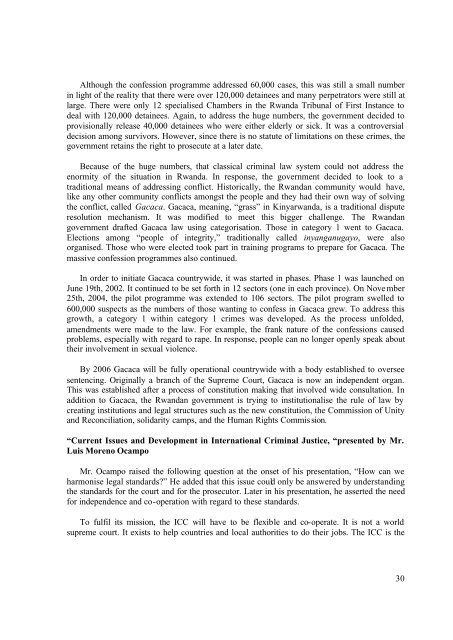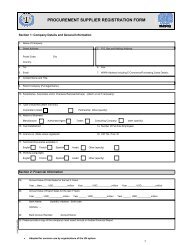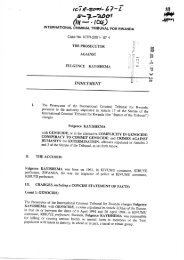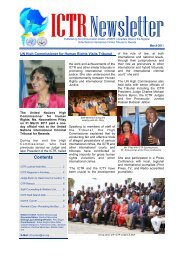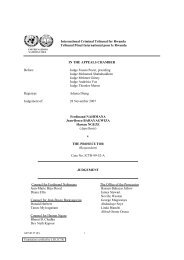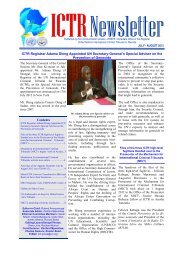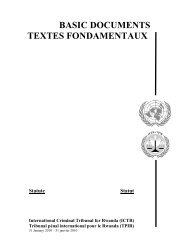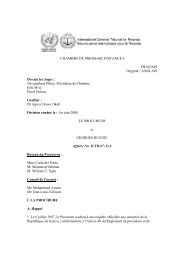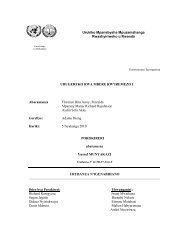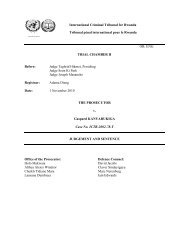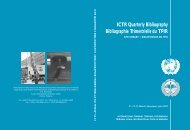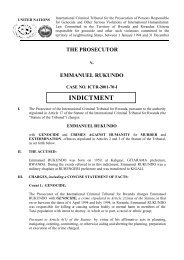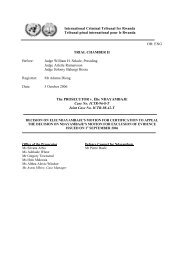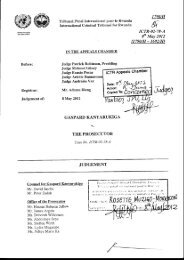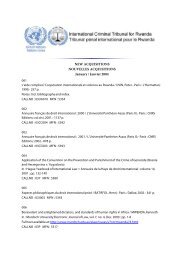Report of Proceedings - International Criminal Tribunal for Rwanda
Report of Proceedings - International Criminal Tribunal for Rwanda
Report of Proceedings - International Criminal Tribunal for Rwanda
You also want an ePaper? Increase the reach of your titles
YUMPU automatically turns print PDFs into web optimized ePapers that Google loves.
Although the confession programme addressed 60,000 cases, this was still a small number<br />
in light <strong>of</strong> the reality that there were over 120,000 detainees and many perpetrators were still at<br />
large. There were only 12 specialised Chambers in the <strong>Rwanda</strong> <strong>Tribunal</strong> <strong>of</strong> First Instance to<br />
deal with 120,000 detainees. Again, to address the huge numbers, the government decided to<br />
provisionally release 40,000 detainees who were either elderly or sick. It was a controversial<br />
decision among survivors. However, since there is no statute <strong>of</strong> limitations on these crimes, the<br />
government retains the right to prosecute at a later date.<br />
Because <strong>of</strong> the huge numbers, that classical criminal law system could not address the<br />
enormity <strong>of</strong> the situation in <strong>Rwanda</strong>. In response, the government decided to look to a<br />
traditional means <strong>of</strong> addressing conflict. Historically, the <strong>Rwanda</strong>n community would have,<br />
like any other community conflicts amongst the people and they had their own way <strong>of</strong> solving<br />
the conflict, called Gacaca. Gacaca, meaning, “grass” in Kinyarwanda, is a traditional dispute<br />
resolution mechanism. It was modified to meet this bigger challenge. The <strong>Rwanda</strong>n<br />
government drafted Gacaca law using categorisation. Those in category 1 went to Gacaca.<br />
Elections among “people <strong>of</strong> integrity,” traditionally called inyanganugayo, were also<br />
organised. Those who were elected took part in training programs to prepare <strong>for</strong> Gacaca. The<br />
massive confession programmes also continued.<br />
In order to initiate Gacaca countrywide, it was started in phases. Phase 1 was launched on<br />
June 19th, 2002. It continued to be set <strong>for</strong>th in 12 sectors (one in each province). On Nove mber<br />
25th, 2004, the pilot programme was extended to 106 sectors. The pilot program swelled to<br />
600,000 suspects as the numbers <strong>of</strong> those wanting to confess in Gacaca grew. To address this<br />
growth, a category 1 within category 1 crimes was developed. As the process unfolded,<br />
amendments were made to the law. For example, the frank nature <strong>of</strong> the confessions caused<br />
problems, especially with regard to rape. In response, people can no longer openly speak about<br />
their involvement in sexual violence.<br />
By 2006 Gacaca will be fully operational countrywide with a body established to oversee<br />
sentencing. Originally a branch <strong>of</strong> the Supreme Court, Gacaca is now an independent organ.<br />
This was established after a process <strong>of</strong> constitution making that involved wide consultation. In<br />
addition to Gacaca, the <strong>Rwanda</strong>n government is trying to institutionalise the rule <strong>of</strong> law by<br />
creating institutions and legal structures such as the new constitution, the Commission <strong>of</strong> Unity<br />
and Reconciliation, solidarity camps, and the Human Rights Commis sion.<br />
“Current Issues and Development in <strong>International</strong> <strong>Criminal</strong> Justice, “presented by Mr.<br />
Luis Moreno Ocampo<br />
Mr. Ocampo raised the following question at the onset <strong>of</strong> his presentation, “How can we<br />
harmonise legal standards?” He added that this issue could only be answered by understanding<br />
the standards <strong>for</strong> the court and <strong>for</strong> the prosecutor. Later in his presentation, he asserted the need<br />
<strong>for</strong> independence and co-operation with regard to these standards.<br />
To fulfil its mission, the ICC will have to be flexible and co-operate. It is not a world<br />
supreme court. It exists to help countries and local authorities to do their jobs. The ICC is the<br />
30


